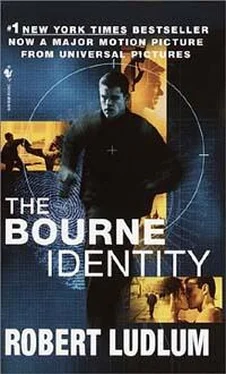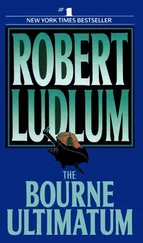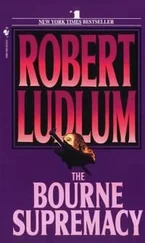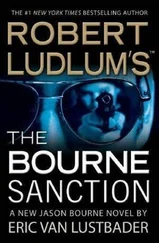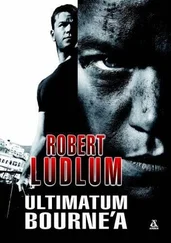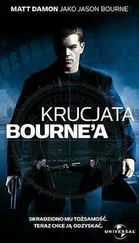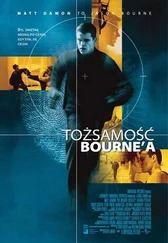The patient wrote out the numbers, relaxing his hand so the writing would be free. He handed the stationery back to the receptionist, who studied it, rose from the chair, and gestured to a row of narrow doors with frosted glass panels. “If you’ll wait in the fourth room, sir, someone will be with you shortly.”
“The fourth room?”
“The fourth door from the left. It will lock automatically.”
“Is that necessary?”
The receptionist glanced at him, startled. “It is in line with your own request, sir,” he said politely, an undertone of surprise beneath his courtesy. “This is a three-zero account. It’s customary at the Gemeinschaft for holders of such accounts to telephone in advance so that a private entrance can be made available.”
“I know that,” lied Washburn’s patient with a casualness he did not feel. “It’s just that I’m in a hurry.”
“I’ll convey that to Verifications, sir.”
“Verifications?” Mr. J. Bourne of New York City, U.S.A., could not help himself; the word had the sound of an alarm.
“Signature Verifications, sir.” The man adjusted his glasses; the movement covered his taking a step nearer his desk, his lower hand inches from a console. “I suggest you wait in Room Four, sir.” The suggestion was not a request; it was an order, the command in the praetorian’s eyes.
“Why not? Just tell them to hurry, will you?” The patient crossed to the fourth door, opened it and walked inside. The door closed automatically; he could hear the click of the lock. J. Bourne looked at the frosted panel; it was no simple pane of glass, for there was a network of thin wires webbed beneath the surface. Undoubtedly if cracked, an alarm would be triggered; he was in a cell, waiting to be summoned.
The rest of the small room was paneled and furnished tastefully, two leather armchairs next to one another, across from a miniature couch flanked by antique tables. At the opposite end was a second door, startling in its contrast; it was made of gray steel. Up-to-date magazines and newspapers in three languages were on the tables. The patient sat down and picked up the Paris edition of the Herald-Tribune. He read the printed words but absorbed nothing. The summons would come any moment now; his mind was consumed by thoughts of maneuver. Maneuver without memory, only by instinct.
Finally, the steel door opened, revealing a tall, slender man with aquiline features and meticulously groomed gray hair. His face was patrician, eager to serve an equal who needed his expertise. He extended his hand, his English refined, mellifluous under his Swiss intonation.
“So very pleased to meet you. Forgive the delay; it was rather humorous, in fact.”
“In what way?”
“I’m afraid you rather startled Herr Koenig. It’s not often a three-zero account arrives without prior notice. He’s quite set in his ways, you know; the unusual ruins his day. On the other hand, it generally makes mine more pleasant. I’m Walther Apfel. Please, come in.” The bank officer released the patient’s hand and gestured toward the steel door. The room beyond was a V-shaped extension of the cell. Dark paneling, heavy comfortable furniture and a wide desk that stood in front of a wider window overlooking the Bahnhofstrasse.
“I’m sorry I upset him,” said J. Bourne. “It’s just that I have very little time.”
“Yes, he relayed that.” Apfel walked around the desk, nodding at the leather armchair in front.
“Do sit down. One or two formalities and we can discuss the business at hand.” Both men sat; the instant they did so the bank officer picked up a white clipboard and leaned across his desk, handing it to the Gemeinschaft client. Secured in place was another sheet of stationery, but instead of two blank lines there were ten, starting below the letterhead and extending to within an inch of the bottom border. “Your signature, please. A minimum of five will be sufficient.”
“I don’t understand. I just did this.”
“And very successfully. Verification confirmed it.”
“Then why again?”
“A signature can be practiced to the point where a single rendition is acceptable. However, successive repetitions will result in flaws if it’s not authentic. A graphological scanner will pick them up instantly; but then I’m sure that’s no concern of yours.” Apfel smiled as he placed a pen at the edge of the desk. “Nor of mine, frankly, but Koenig insists.”
“He’s a cautious man,” said the patient, taking the pen and starting to write. He had begun the fourth set when the banker stopped him.
“That will do; the rest really is a waste of time.” Apfel held out his hand for the clipboard.
“Verifications said you weren’t even a borderline case. Upon receipt of this, the account will be delivered.” He inserted the sheet of paper into the slot of a metal case on the right side of his desk and pressed a button; a shaft of bright light flared and then went out. “This transmits the signatures directly to the scanner,” continued the banker. “Which, of course, is programmed. Again, frankly, it’s all a bit foolish. No one forewarned of our precautions would consent to the additional signatures if he were an imposter.”
“Why not? As long as he’d gone this far, why not chance it?”
“There is only one entrance to this office, conversely one exit. I’m sure you heard the lock snap shut in the waiting room.”
“And saw the wire mesh in the glass,” added the patient.
“Then you understand. A certified imposter would be trapped.”
“Suppose he had a gun?”
“You don’t.”
“No one searched me.”
“The elevator did. From four different angles. If you had been armed, the machinery would have stopped between the first and second floors.”
“You’re all cautious.”
“We try to be of service.” The telephone rang. Apfel answered. “Yes? … Come in.” The banker glanced at his client. “Your account file’s here.”
“That was quick.”
“Herr Koenig signed for it several minutes ago; he was merely waiting for the scanner release.” Apfel opened a drawer and took out a ring of keys. “I’m sure he’s disappointed. He was quite certain something was amiss.”
The steel door opened and the receptionist entered carrying a black metal container, which he placed on the desk next to a tray that held a bottle of Perrier and two glasses.
“Are you enjoying your stay in Zurich?” asked the banker, obviously to fill in the silence.
“Very much so. My room overlooks the lake. It’s a nice view, very peaceful, quiet.”
“Splendid,” said Apfel, pouring a glass of Perrier for his client. Herr Koenig left; the door was closed and the banker returned to business.
“Your account, sir,” he said, selecting a key from the ring. “May I unlock the case or would you prefer doing so yourself?”
“Go ahead. Open it.”
The banker looked up. “I said unlock, not open. That’s not my privilege, nor would I care for the responsibility.”
“Why not?”
“In the event your identity is listed, it’s not my position to be aware of it.”
“Suppose I wanted business transacted? Money transferred, sent to someone else?”
“It could be accomplished with your numerical, signature on a withdrawal form.”
“Or sent to another bank —outside of Switzerland? For me.”
“Then a name would be required. Under those circumstances an identity would be both my responsibility and my privilege.”
“Open it.”
The bank officer did so. Dr. Washburn’s patient held his breath, a sharp pain forming in the pit of his stomach. Apfel took out a sheaf of statements held together by an outsized paperclip. His banker’s eyes strayed to the right-hand column of the top pages, his banker’s expression unchanged, but not totally. His lower lip stretched ever so slightly, creasing the corner of his mouth; he leaned forward and handed the pages to their owner.
Читать дальше
